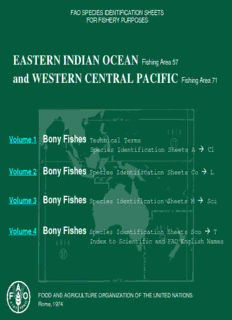
EASTERN INDIAN OCEAN Fishing Area 57 and WESTERN CENTRAL PACIFIC Fishing Area 71 PDF
Preview EASTERN INDIAN OCEAN Fishing Area 57 and WESTERN CENTRAL PACIFIC Fishing Area 71
FAO SPECIES IDENTIFICATION SHEETS FOR FISHERY PURPOSES EASTERN INDIAN OCEAN Fishing Area 57 and WESTERN CENTRAL PACIFIC Fishing Area 71 Volume 1 Bony Fishes Technical Terms Species Identification Sheets A (cid:224) Cl Volume 2 Bony Fishes Species Identification Sheets Co (cid:224) L Volume 3 Bony Fishes Species Identification Sheets M (cid:224) Sci Volume 4 Bony Fishes Species Identification Sheets Sco (cid:224) T Index to Scientific and FAO English Names FOOD AND AGRICULTURE ORGANIZATION OF THE UNITED NATIONS Rome, 1974 FAO SPECIES IDENTIFICATION SHEETS FOR FISHERY PURPOSES EASTERN INDIAN OCEAN Fishing Area 57 and WESTERN CENTRAL PACIFIC Fishing Area 71 VOLUME III FOOD AND AGRICULTURE ORGANIZATION OF THE UNITED NATIONS Rome, 1974 FAO SPECIES IDENTIFICATION SHEETS FOR FISHERY PURPOSES EASTERN INDIAN OCEAN (Fishing Area 57) and WESTERN CENTRAL PACIFIC (Fishing Area 71) Compiled by the Fishery Resources and Environment Division, FAO Based on material prepared at the FAO/DANIDA Seminar on Fish Taxonomy in South East Asia held at the Phuket Marine Biological Center, Phuket, Thailand, 6 November to 8 December 1972 This publication has been printed on behalf of the UNDP/FAO South China Sea Fisheries Development and Coordinating Programme for the use of its participating countries VOLUME III - Bony Fishes: Families from M to S (in part) FOOD AND AGRICULTURE ORGANIZATION OF THE UNITED NATIONS Rome, 1974 Bibliographic Reference: Fischer, W. & P.J.P. Whitehead (Eds.) (1974) Rome, FAO, pag. var. FAO species identification sheets for fishery purposes. Eastern Indian Ocean (fishing area 57) and Western Central Pacific (fishing area 71). Volume 3 ISW, ISEW. Teleostei. Identification sheets - taxonomy, geographic distribution, fisheries, vernacular names. click for next page click for previous page Other Volumes FAO Sheets Fishing Areas 57,71 CONTENTS VOLUME III OTHER VOLUMES BONY FISHES Family Sheets (in alphabetical order) M Megalopidae Mu gilidae Mullidae Muraenesocidae N – O Nemipteridae Plate I Plate II Plate III P – R Pentapodidae Polynemidae Po madasyidae Pomatomidae Priacanthidae Psettodidae Rachycentridae S Sciaenidae click for next page click for previous page M (cid:9)(cid:9)(cid:9)(cid:9)(cid:9) MEGAL 1974 FAO SPECIES IDENTIFICATION SHEETS FISHING AREAS 57,71 (E Ind. Ocean) (W Cent. Pacific) MEGALOPIDAE Tarpons Moderately deep-bodied, fusiform fishes, resembling Clupeidae (herrings) but possessing a lateral line and lacking scutes along belly. A single dorsal fin, with unbranched rays soft and last dorsal ray filamentous; anal fin origin set a little behind last dorsal ray. Bony gular plate between arms of lower, jaw. Pseudobranch absent (gill-like structure on inner face of gill cover). Scales large; lateral line present, with up to 40 scales. Colour: back blue/green, flanks silvery. SIMILAR FAMILIES OCCURRING IN THE AREA: Clupeidae: usually have sharp keel of scutes along belly; also, no lateral Line and no gul ar plate. gular plate Elopidae: have smaller scales (about 100 in lateral line) and last dorsal in ray not filamentous. Chanidae: last dorsal fin ray not filamentous. Albulidae: last dorsal fin ray not filamentous; also, snout projecting, mouth inferior. Megalopidae, Elopidae underside of head FAO Sheets MEGALOPIDAE Fishing Areas 57,71 Key to Genera Megalops only (Tarpon an Atlantic genus) List of Species occurring in the Area (Code numbers are given for those species for which Identification Sheets are included) Megalops cyprinoides MEGAL Megal 1 MEGAL Megal 1 1974 FAO SPECIES IDENTIFICATION SHEETS FAMILY: MEGALOPIDAE FISHING AREAS 57,71 (E Ind. Ocean) (W Cent. Pacific) Megalops cyprinoides (Broussonet, 1782) SYNONYMS STILL IN USE: None VERNACULAR NAMES: FAO: En - Indo-Pacific tarpon Fr Sp - NATIONAL: DISTINCTIVE CHARACTERS: Body fusiform, somewhat compressed, with smooth, unkeeled belly. Single dorsal fin, the last ray a long filament; anal fin origin behind base of last dorsal ray. Upper jaw reaching almost to hind border of eye; lower jaw projecting slightly. Gular plate present between arms of lower jaw. Branchiostegal rays 26 to 27. Pseudobranch absent (gill-like structure on inner face of gill cover). Scales present, large; lateral line with 30 to 40 scales. Colour: back blue/green, flanks silvery; lateral line golden. gular DIFFERENTIAL CHARACTERS OF SIMILAR SPECIES OCCURRING IN THE AREA: plate Species of Clupeidae: lateral line and gular plate absent, but scutes along belly in most species. Elops machnata: no filamentous last dorsal ray and much smaller scales (about 100 in lateral series; no more than 40 in Megalops cyprinoides). Megalops SIZE: Maximum: 55 cm; common: 25 to 30 cm. GEOGRAPHICAL DISTRIBUTION AND BEHAVIOUR: Throughout whole of northern part of area, southward to tropical waters of Australia; also, westward to East Africa and eastward to Hawaii. A coastal pelagic species. PRESENT FISHING GROUNDS: Throughout its range. CATCHES, MAIN FISHING GEAR AND PRINCIPAL FORMS OF UTILIZATION: Separate statistics are not reported for this species. Caught with gill nets and trawls. Marketed usually fresh or dried-salted.
Description: